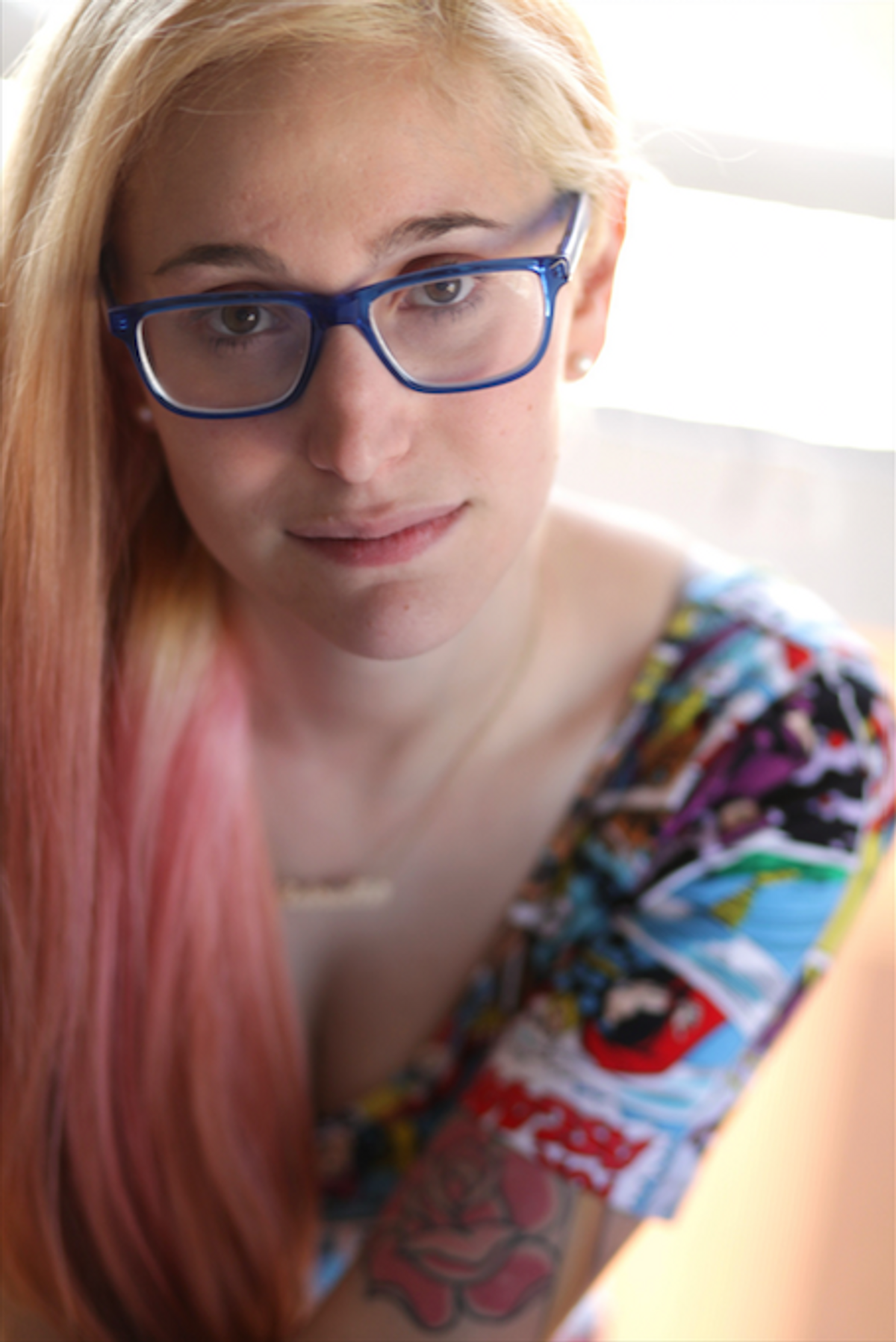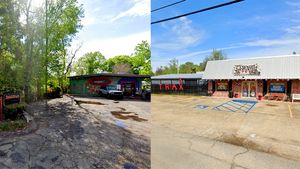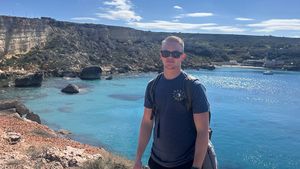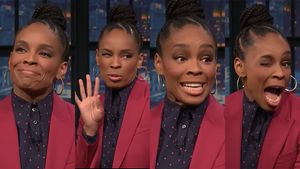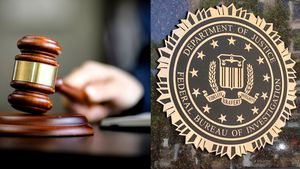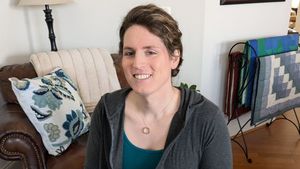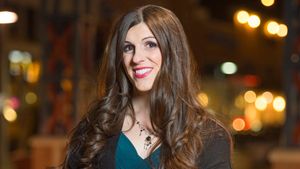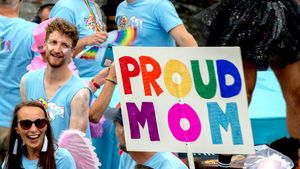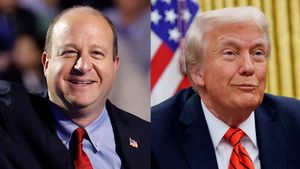When Gaby Dunn, co-creator of the popular web series Just Between Us, started her YouTube channel two years ago with her best friend (and then crush) Allison Raskin, she jokes that she'd done it for "chicks mostly." The scope has gotten a little bigger since then. Formerly of Buzzfeed and 100 Interviews, Dunn, along with Raskin, run a channel that has grown to over 670,000 subscribers, was nominated for a Shorty Award, and features biweekly videos which average hundreds of thousands of views. Promising a comedic relationship advice show every Monday and a short sketch every Thursday, Just Between Us is popular for discussing queer issues (including Dunn's own bisexuality and polyamory), mental health (including Raskin's OCD), and, obviously, its humor.
We sat down with Dunn discuss her character, relationships, and the vulnerability of content creators.
Out: In just Just Between Us, you play a charcater that is based on you, but a past you. You're probably in such a different place now, but all content still lives on the Internet. Is that hard for you?
It's easier for me than it is for Allison. I think she is very clearly a character. I mean, it's based on her, but she's sort of a less self-aware version of herself and that comes to bite her sometimes, because people think that really is her. My character is much closer to what I'm like, but you know, I think we use stuff that we already know to teach a lesson or to show examples on the channel.
People always think that I'm going to be unreasonable. I think when they talk to me they think I'm going to be very angry and defensive and unreasonable, because the character is so aggressive with her opinions. People come to me sometimes ready to argue because they just saw a video or something, and I'm just at home like, "I'm not trying to argue with you dude." Like I'll hear you out, and I don't really care, but I think people think I won't hear them out.
A lot of people watch your show for relationship guidance. Who do you go to when you need advice?
Well a lot of times, Allison and I will go to each other. She's very straightforward, and I don't wanna say harsh, but she can be very like, "I hate this person now!" or, "This person's crazy, that's why you don't like this." She's very blunt with me, which is nice.
I have some friends in the queer community that I've talked to, but I've been thinking lately that I need more polyamorous friends. I went to A-Camp this past year, and I went to a poly panel there, and there were a lot of really cool people, and that was like two weeks ago, so I'm just starting to become friends with these people. I am so weirdly thirsty about it, where I'm like, "You guys wanna be friends and like maybe talk about poly stuff? Okay? We just hang out all the time?" It's just so weirdly thirsty to be like, "Okay look at all these people! They get where I am, this is so great."
What are some big things that you've learned from your relationships that maybe monogamous people wouldn't know?
I think a lot of people think they have to be unhappy. It sounds like a weird thing to say, but I have so many friends who are just like, "But I'm in love!" And I'm like, "Right, but you're crying every day." And they're like, "Right, but that's because we love each other." And I'm like, "Right, again, you're sad all the time." And there's this sort of romanticization of just like this tragedy of "No, we love each other, that's why we fight, that's why we are sad all the time."
I guess I bought into that for a while, but in my current relationship I'm like, "Oh, you don't have to be sad all the time." You can just calm down. It doesn't have to be this dramatic thing every day. If you just have a day with your partner where you're not talking as much or you're quiet, or someone's busy, it's not a moratorium on the relationship. I think people have this expectation that it needs to be perfect 100 percent of the time. And then they drive themselves up a wall trying to make it perfect all the time.
I read "Get Rich Or Die Vlogging," which talks about how a lot of YouTubers are really struggling financially. I like how you focused on the effect this had on women and minorities. Do you also feel that when marginalized people create content, there are unique struggles for them, in the sense that they have to invest in themselves in a world that tells them that they shouldn't?
[Finances] definitely bleed over into art. It's radical for someone who is a minority, like a person of color or someone in the LGBTQ community, to be arrogant or confident in his or her work. So if a white guy is a first time director, he's allowed to be like, "Yes, I deserve to direct this large movie even though I've never directed anything before, thank you Marvel studios." But if a woman, especially a woman of color or queer person is like, "I want to be able to direct," they need to have 45 credits, and they're still not good enough. So I think you internalize that and you think, "Well, I'm lucky to get anything." Then you're grateful for scraps. And then that allows companies and studios run by straight white cis men to exploit you and under pay you and take advantage of you and then you internalize that treatment. Then you think, "I should make something of my own," which becomes, "Well why bother? It's not going to be good anyway."
The number of queer folks and people of color, and queer people of color and trans people of color who have been let go by big companies--all of us could get together and start our own company. Why aren't we doing that? It's because we think we have to get in with these companies that already exist and that are run by white men. You know what I mean? We think, "Oh, we're not good enough to start our own company, we're not good enough to do that." But it's like, "Why were five white dudes good enough to start a company?"
When all of this bullshit is happening, how do you self-care?
I usually will get very into a television show.
What are you watching now?
I watch UnREAL. I finished UnREAL recently, it was very good and very fucked up. I do a lot of hanging out, like this past weekend I hung out with just queer women. I had other plans and I was like, "I gotta bail on you guys. I need to be with the community right now." When I moved to L.A., I went out of my way to make friends with queer female community especially, and I think that's an important thing that is tough to do. You've gotta go to mixers, and whatever other bullshit. But it's very important because when stuff happens and you need it, they're there. Like one of my friends had everyone meet for brunch the day after the Orlando shooting, and we all hung out together and put on temporary tattoos. We all put on rainbow tattoos and tried to like, make each other feel better, and we went over to this lesbian comedian couple's house, and a bunch of people were there and we just had beers and played with dogs and tried to be a community.
That lesbian comedian couple--are you talking about Cameron Esposito?
Yeah, I'm obsessed with her and Rhea [Butcher], pretty much. It's very weird that they are allowing me to be friends with them when I'm so obsessed with them. I've like told them that I'm obsessed with them and they're still like, "Great, be our friend!" I'm like, you shouldn't be friends with me!
I mean, you're famous, too.
Yeah... [laughs] I get a lot of shit for being like, "Oh, you're a famous millennial? Good for you, how exciting for you. What's it like to be a famous millennial? Is it just great? You're just on Snapchat all day?"
So in five years, where do you want to take JBU and your career?
Well Allison and I both want to be showrunners. We're not a traditional writing team in the sense that we don't usually write together, usually one of us will write the sketches and then we'll look them over and do touch-ups or approve them or whatever. But we usually don't write together, so we're working on stuff together, TV stuff, and we'd love to write a book.
I wanna have a bunch of shows, and I wanna have a brand that people know they can come to and trust for queer content where we're not gonna like, bury the gays, and we're not gonna fall victim to tropes. Hopefully we'll get some good representation. I was joking at A-Camp with Brittani Nichols and the creators of Her Story. We were joking how we wanna be like, the new Judd Apatow crew. Be like the queer/trans-women-Judd Apatow crew where we just make stuff forever and work together on a bunch of shit and just kind of build our own empire.
